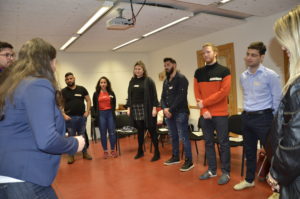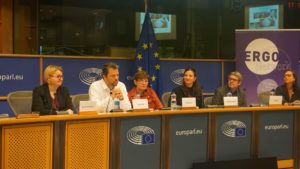Annual Members Meeting 2019
From 20-22 October 2019, ERGO Network’s members came together in Skopje, North Macedonia, to share updates from the past year, set future priorities and learn from each other.
On day 1, the participants attended working groups to define the future priorities of the organisation on the topics of employment, data collection and governance of the network. The governance working group discussed for example the legal status of ERGO, the criteria for membership and rights and responsibilities of members and the board.

Day 2 started with an introduction to different working areas of ERGO Network: The ERGO team and some of the members explained our work on Community-Led Local Development (CLLD), the Most Roma friendly Mayor campaign, our work towards the Post 2020 EU Roma Strategy and support for national advocacy and mobilisation.
In the afternoon, participants had the opportunity to gain new skills for their work back home: Monika Mihaličková led the group through a process of creating fundraising campaigns for the projects of their organisations. Another workshop focused on how to use graphic cues when facilitating meetings, held by Alejandro Gil Carasso.
Day 3 started with exchanging views on the priorities for advocating on the EU’s Post 2020 EU Roma Framework. The participants agreed that the most important topics that we should ask for are an increase of participation of Roma in all areas of designing and monitoring policies and continued EU support for the Western Balkans. National governments should commit to include support for Roma culture, language, history and actions to combat antigypsyism in the National Roma Integration Strategies.
In the afternoon, a group of participants had the opportunity to visit the Municipality Šuto Orizari (Šutka), where Roma are the majority with more than 13,000 inhabitants, and which is governed by a Roma mayor – Kurto Duduš.

Mr. Duduš took the time to meet the group and to explain important developments for the Romani population in the town. In his term, a new pre-school was built, the municipality invested in repairing main roads and the local high school doubled the number of its students. 25 of them were accepted to university this year! The municipality also has an outpatient clinic, where most inhabitants of Šuto Orizari and from nearby villages are treated.
The Annual Members Meeting 2019 closed with a party for all attending ERGO Network members.
We thank our member organization RROMA for welcoming us in Skopje and hosting us in these days!






 The Roma Week would not make any sense without the active involvement of Roma activists from across Europe. Therefore, together with the Central Council of German Sinti and Roma, the Documentation and Cultural Centre and ternYpe International Roma Youth Network, ERGO Network invited a group of youth activists to prepare for the week in the Roma Youth Advocacy Training. Moreover, ERGO Network coordinated the participation of the most important Roma civil society activists in Europe under the umbrella of the ‘Alliance against Antigypsyism’ together with the Central Council of German Sinti and Roma.
The Roma Week would not make any sense without the active involvement of Roma activists from across Europe. Therefore, together with the Central Council of German Sinti and Roma, the Documentation and Cultural Centre and ternYpe International Roma Youth Network, ERGO Network invited a group of youth activists to prepare for the week in the Roma Youth Advocacy Training. Moreover, ERGO Network coordinated the participation of the most important Roma civil society activists in Europe under the umbrella of the ‘Alliance against Antigypsyism’ together with the Central Council of German Sinti and Roma. On Wednesday, ERGO Network together with Cornelia Ernst MEP brought the UN’s Sustainable Development Goals as a tool to support the fight against antigypsyism to the agenda. The panel discussion was held together with Global Call to Action against Poverty (GCAP), Sozialfabrik and Soraya Post MEP. The panellists discussed recommendations to civil society on how to use the 2030 Agenda, brought by ERGO Network in the new paper ‘
On Wednesday, ERGO Network together with Cornelia Ernst MEP brought the UN’s Sustainable Development Goals as a tool to support the fight against antigypsyism to the agenda. The panel discussion was held together with Global Call to Action against Poverty (GCAP), Sozialfabrik and Soraya Post MEP. The panellists discussed recommendations to civil society on how to use the 2030 Agenda, brought by ERGO Network in the new paper ‘ Members of the European Parliament from different political groups signed a pledge affirming that they will continue to work to achieve non-racist EU elections, an effective Post-2020 EU Roma Framework and a continuation of the fight against antigypsyism in the new legislative period. The undersigned MEPs pledged to create a European society in which Roma can access and enjoy their rights set in our Treaties, in which Roma can fulfil their true potential, in which dehumanisation of Roma is stopped, a healthy European society free from racism, such as antigypsyism – a Europe that we can be proud of.
Members of the European Parliament from different political groups signed a pledge affirming that they will continue to work to achieve non-racist EU elections, an effective Post-2020 EU Roma Framework and a continuation of the fight against antigypsyism in the new legislative period. The undersigned MEPs pledged to create a European society in which Roma can access and enjoy their rights set in our Treaties, in which Roma can fulfil their true potential, in which dehumanisation of Roma is stopped, a healthy European society free from racism, such as antigypsyism – a Europe that we can be proud of.

